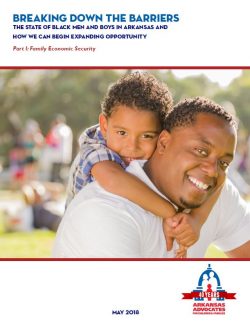
Across the board, black men and boys in Arkansas encounter significant barriers. They face a higher rate of infant mortality, child poverty, and incarceration than their white peers. They also have lower high-school graduation rates and family income levels. These outcomes are a result of decades of policy decisions that held back and held down black Arkansans.
Continuing a dialog about the obstacles facing black men and boys in our state is a necessary first step on our journey to become a more equitable Arkansas, one in which all people, regardless of race, can thrive. This is the first data snapshot in a series that details the state of black men and boys in Arkansas. This first snapshot specifically focuses on family economic security and where black men and boys stand. The brief also offers policy solutions that can help black men and boys succeed. While we are still researching the many root causes of these inequities, we felt it was imperative to share some initial data.
A few of the key takeaways:
- Decades of discriminatory policy decisions in Arkansas have created barriers to success for black men and boys. Until we remove these systemic barriers, black men and boys in our state will likely continue to have higher rates of infant mortality, child poverty, and incarceration.
- One of the biggest roadblocks to success for black men and boys in Arkansas is limited access to financial security. If we paid black men the same as their white counterparts, their typical income would increase by over $11,800 a year in Arkansas.
- Common-sense solutions that will improve equity in our state include Earned Income Tax Credits, a strong unemployment insurance system, protecting against wage theft, and expanding access to paid leave. By lifting up policies that will improve equity for black men and boys, we will also strengthen financial security for all Arkansans.
Read more in the full snapshot here.
